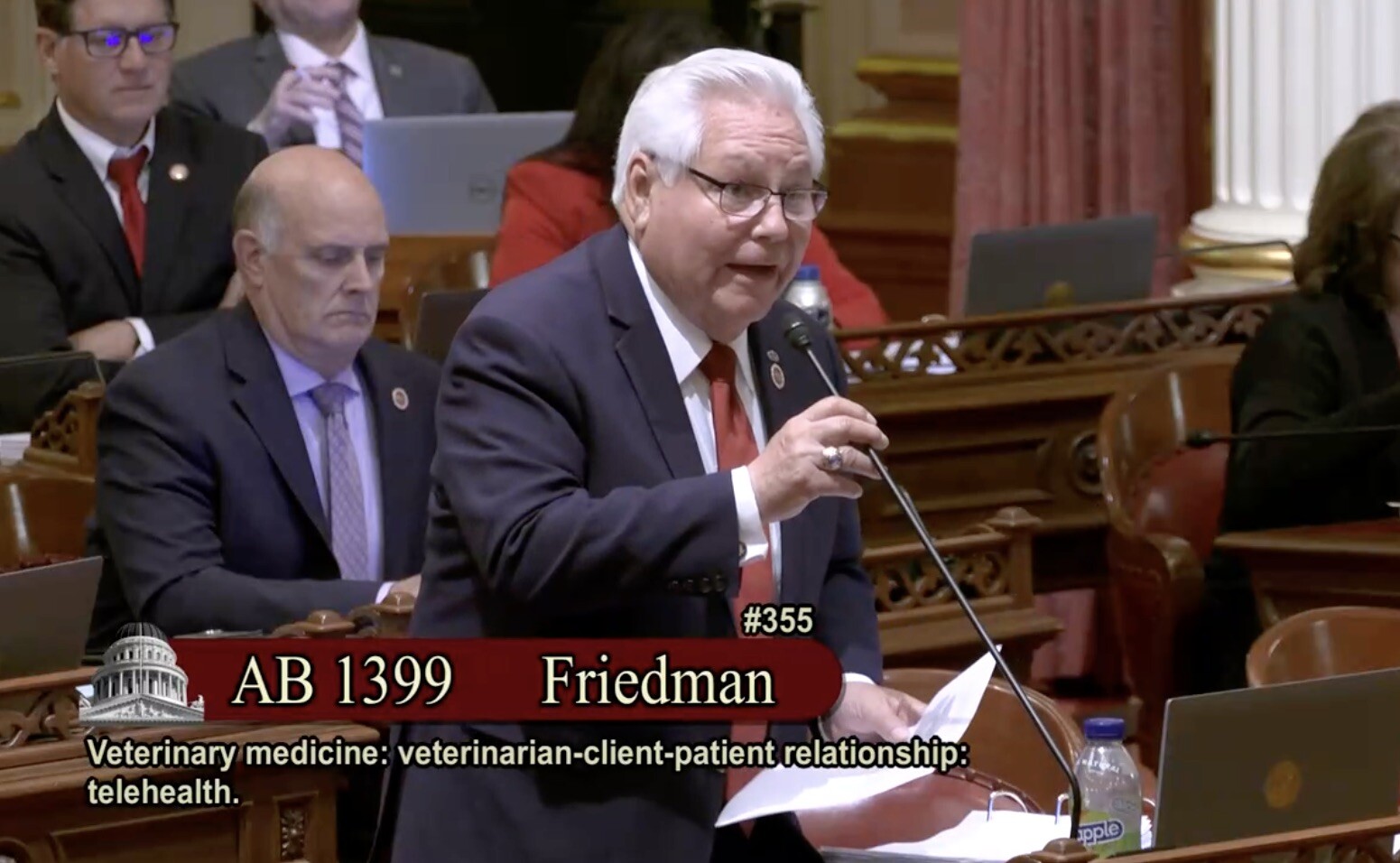!This story has an important update
 Listen to this story.
Listen to this story.
Sen. Bob Archuleta

VIN News Service screenshot
On Monday, state Sen. Bob Archuleta urged lawmakers to support a bill to "safely reduce unnecessary barriers" to veterinary telemedicine in California. The Senate voted 36-3 in favor of AB 1399 and returned it to the state Assembly today for a concurrence vote on amendments. The bill is expected to be on the governor's desk for final approval by next week.
California lawmakers passed a bill on Monday allowing the formation of a veterinarian-client-patient relationship (VCPR) through remote methods. If Gov. Gavin Newsom doesn't veto the initiative, it could herald a paradigm shift for veterinary telemedicine in the nation's most populous state and beyond, reflecting a trend that is already unfolding.
In May, Arizona adopted a similar measure.
The developments mark significant wins for advocates of relaxed veterinary telemedicine regulations, disrupting the conventional approach of only offering remote care after a veterinarian conducts an in-person exam, a requirement strongly supported by most of organized veterinary medicine.
Fundamental changes are underway, said Mark Cushing, a lobbyist and co-founder of the Veterinary Virtual Care Association (VVCA), a nonprofit that originally sponsored the California bill on behalf of its members, which include commercial telemedicine providers such as Chewy and Dutch Pet.
"What's happened now is the landscape has changed," Cushing said last week, predicting that the bill would advance in an interview with the VIN News Service. "You've got essentially two states together with pretty close to 50 million people, a pretty meaningful chunk of the U.S., adopting a model for veterinary telemedicine that isn't scary or reckless, which will make it easier to spread."
Cushing says it's occurring already: "I can't tell you the state, but there's going to be one more area of activity this year that I think will go the same direction."
He anticipates that "2024 is going to be a busy year, because what happens on policy issues like this, whatever the field is, once major states start turning, there's a whole different tempo and momentum."
The VVCA is pushing states to relax the minimum standard that a VCPR be established in person rather than remotely. The in-person rule arises from the inability of animals to verbally communicate their health issues, so they need to be examined hands-on. It has been adopted in some form by most states and is endorsed by the American Veterinary Medical Association. However, it also serves as a barrier to the provision of online-only care.
If Assembly Bill 1399 becomes law, California will be the sixth state in the nation to eliminate this requirement and allow for the remote establishment of a VCPR, joining Arizona, Idaho, New Jersey, Vermont and Virginia. The governor has until Oct. 14 to sign or veto the measure. If enacted, the new law will take effect on Jan. 1.
After opposing the bill for several months, the California Veterinary Medical Association shifted to a neutral position last week following modifications to the legislation that included certain safeguards. Nonetheless, concerns persist, particularly regarding the absence of a mandate for telemedicine providers to maintain a physical presence in California. "We wanted it to be that the premises where the telemedicine provider worked could see the animal if the treatment plan isn't working," said Dr. Grant Miller, CVMA director of regulatory affairs. "Is the information that a veterinarian can gather about their patient via an electronic appointment as thorough as what can be obtained through in-person examination? In most cases, the answer is no."
Even though the CVMA changed its position on the bill, the AVMA remains staunchly opposed to watering down VCPR parameters.
In a recent editorial published in the Journal of the American Veterinary Medical Association, Dr. Lori Teller, former AVMA president, elaborated: "Some people say some care is better than no care, but that's not true if you have the wrong diagnosis and the wrong treatment plan."
What's motivating telemedicine advocacy?
Commercial telemedicine providers and nonprofit animal welfare entities are leading the push to remove state requirements that restrict the establishment of a VCPR to in-person interactions. The provisions pose a challenge for Dutch Pet, Walmart and a growing number of digital startups vying to capture a portion of the veterinary telemedicine market, currently worth $530 million in revenue and anticipated to double by 2028, according to analysts.
The push to lower barriers to veterinary telemedicine reflects an effort by advocates to parallel human medicine. Telehealth for human patients is unrestricted across all 50 U.S. states.
Proponents argue that the growth of the veterinary industry is being driven by consumer demand for cost-effective and convenient alternatives to traditional veterinary care — demand that's surged in response to a perceived national shortage of veterinarians that's restricted access to services in some areas. Consequently, nonprofit organizations such as the San Diego Humane Society, San Francisco Society for the Prevention of Cruelty to Animals and American Society for the Prevention of Cruelty to Animals stepped in to assume sponsorship of the bill, previously held by the VVCA. The welfare groups say remote care can help alleviate veterinary shortages plaguing shelters in particular.
"AB 1399 will make it legal for veterinarians to provide medical care for pets virtually," reads an online action alert from the San Diego Humane Society. "If the bill passes, pets will be able to receive care more quickly, and in situations where a physical visit is impossible."
Brittany Benesi, ASPCA senior legislative director, said as much during a hearing last spring in the California Assembly Business and Professions Committee. A recent in-house survey of pet owners, she said, revealed that approximately a quarter of respondents had an unmet need for veterinary care during the past two years and might have used telemedicine. The survey did not specify the sample size or the number of respondents. However, the findings indicated that individuals couldn't access the veterinary services due to affordability issues or other barriers, such as proximity, language constraints or a lack of knowledge about where to seek care.
"With California's unreasonably stringent regulations explicitly prohibiting the use of veterinary telehealth to establish a veterinarian-client-patient relationship, it is clear we are leaving a clear tool out of the veterinary toolbox — a tool that is available and being safely deployed in other states," Benesi said. She added that according to the VVCA, "no U.S. or Canadian jurisdiction has reported harm to a pet as a result."
Determining whether this is true in California is difficult, as the state Veterinary Medical Board does not differentiate between or track complaints based on whether they resulted from care provided by telemedicine or face-to-face.
Several critics of the bill suggest that shelters see telemedicine as a way to cut costs by substituting on-site veterinarians with remote practitioners. One practitioner who requested anonymity since they are affiliated with a shelter told VIN News, "Now the shelters can fire the veterinarians who work there and let a doctor online tell the staff what to do."
Despite this concern, California Assembly Member Laura Friedman, who introduced AB 1399, has publicly emphasized the bill's focus on convenience and access. "I'm not going to stop going to the vet," she told lawmakers in April, "but there are times when I wish I could jump on a Zoom and ask, 'Hey, take a look at this rash. Do I need to bring Findley in, or can I just put some Vaseline on it?' "
California vs. Arizona
Similarly, a bill that allows veterinarians to use technology to deliver virtual care to pets recently sailed through the Arizona Legislature despite resistance from veterinary groups in the state. On May 8, Gov. Katie Hobbs signed Senate Bill 1053 into law. When it takes effect on Oct. 30, veterinarians licensed to practice in Arizona no longer will need to see patients in the flesh to establish a VCPR, so long as certain restrictions and conditions are followed for treating patients remotely:
- Veterinarians must obtain informed consent from clients.
- Prescriptions may be issued for no more than 14 days initially and renewed for another 14 days with an additional electronic examination.
- Controlled substances cannot be prescribed based solely on an electronic examination.
- Veterinarians must secure an alternate means of contacting the client if the electronic means is interrupted.
The recent Arizona law excludes animals engaged in commercial food production from its scope. The California bill also contains exemptions but not for food animals, which are covered by federal regulations. Rather, it excludes horses participating in racing or training activities within the purview of the California Horse Racing Board.
The California bill similarly reflects the Arizona law's disclosure and licensing requirements and its prohibition on the provision of controlled substances. However, it differs by:
- placing a 14-day limit only on antibiotic prescriptions and requiring that the animal patient be seen in person for antibiotic prescription renewals;
- providing a six-month limit on all other prescriptions, which can then be renewed through another telemedicine appointment;
- preventing California-licensed veterinarians from practicing telemedicine on animal patients that reside outside of the state; and
- affirming that veterinarians who establish a VCPR via telemedicine will be held to the same practice as those who establish a VCPR by way of an in-person exam.
Update: Gov. Gavin Newsom announced on Oct. 8 that he had signed AB 1399, among other bills. When the law takes effect on Jan. 1, veterinarians licensed in California will be permitted to care for patients via telemedicine without first examining them in person.